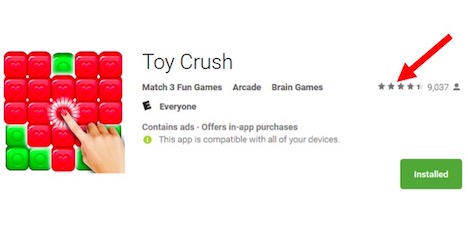Can You Really Trust App Store Ratings?
How do you evaluate the quality of a gaming app? Chances are you’ve come across apps through links on social media, word-of-mouth, or you’ve navigated to the Google Play Store on your own. If we base our decisions on ratings systems – which most of us do – only the most highly rated game apps will capture our attention.
The Google Play Store, like the App Store, makes it rather easy for users to quickly assess the quality of a game app through a star rating system. As a case in point, Toy Crush has a stellar 4.5/5 rating from 9,037 reviewers. As the number of reviewers increases, so too does the credibility of the overall score. Of course, a caveat is in order: the rating system must be impervious to pseudo-accounts for it to be believable.
What are the Rules for Google Play Store Ratings?
Believe it or not, many game developers purchase reviews from social marketing channels to bolster the popularity of their apps, to increase their ranking in Google. However, this is a risky proposition given that a company’s name and its product stands to lose out if it gets blacklisted, delisted, or deleted from Google’s archives. It comes as no surprise that many game developers will go to great lengths to create 5-star reviews of their games for players. If people actively seek high-ranking games at the Play Store it makes sense to invest as much as possible in a favourable ranking. According to analysis, it can take several months for a typical app to generate 100 authentic reviews.
Social media gurus routinely comment on the danger posed to game developers of using fake reviews. While it provides the window dressing that companies need – it’s not sustainable. Once Google uncovers the ruse, it’s game over. For this reason, many social media marketing companies have now stopped providing app reviews to clients. Unfortunately, in its anxiety to reduce the spam count of Play Store ratings on games, Google is also deleting authentic reviews according to various social media commentators. Further analysis reveals that it’s the high-ranking app review scores that are losing out, and not the low-ranking scores. So how do you protect yourself against app review manipulation?
Effective Ways to Guard against Manipulated Reviews at the Play Store
The Google Play Store is home to thousands of game apps. It’s one of the most competitive arenas for game developers, given that all of your details must be provided for you to list your game. There is very little benefit to be had by creating fake reviews with your company details posted on the same page. In fact, a company’s reputation – credibility, trust, and authenticity – is worth more than the individual games it has created. Google requires authentic information from the game developer to host the game on site. When you’re searching for games like Toy Crush, you can crosscheck the game’s ratings with a myriad of online sources. These include the following:
Test the game for yourself. As bakers say – the proof of the pudding is in the eating. There is no better way to evaluate the authenticity of reviews than playing the game yourself. When you are ready to gear up for a Block Blast session with Toy Crush you will quickly understand why this app has a 4.5/5 rating from 9,037+ reviewers.
Run a test search on the game developer/owner-operator of the company. Google offers a veritable treasure trove of information on game developers. You will quickly find everything you’re looking for. Things like company licensing and registration, jurisdiction, and authority, other games and services etc. will be listed.
Read external reviews of the game, especially those that provide insights into the pros and cons.
Read some of the Google Play Store reviews and see for yourself if they look legitimate. Any app that glorifies a game without providing constructive criticism is not entirely useful. If you notice that there are several game reviews generated on the same date, that could indicate that somebody has been paid to write separate reviews and post them. Reviews that are spaced out over time look more authentic, and probably are.
Tags: game, mobile app, online game




















































